Our Research
Research is the foundation to advancing the energy performance of buildings. NBI studies show a pathway to more advanced design practices and technology applications.
Research
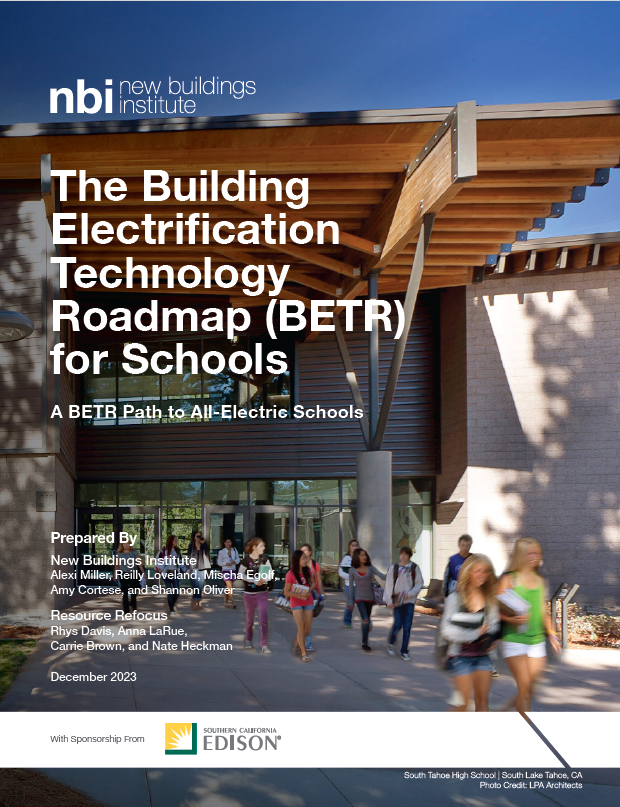
The Building Electrification Technology Roadmap for Schools
Report / January 29, 2024
Learn strategies tailored for K-12 schools to reduce carbon emissions from water heating, HVAC, buses, and other technologies that power classrooms and operational spaces. This report provides K-12 leaders a roadmap and decision-making tools to electrify their school buildings.
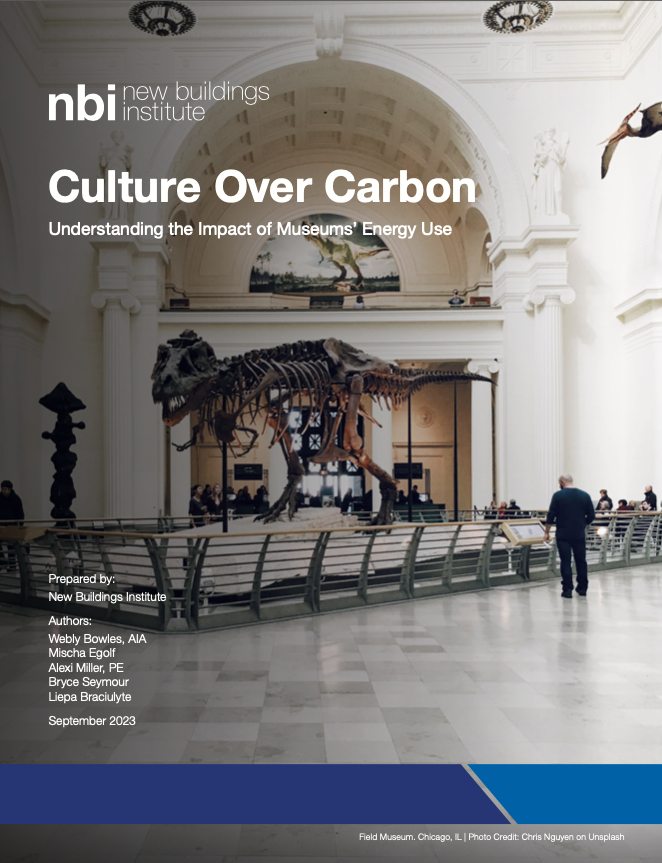
Culture Over Carbon
Report / September 7, 2023
The Culture Over Carbon report shares the first in depth review of energy use patterns in cultural institutions across the United States and creates a roadmap for energy reductions based on best practices from this sector. Cultural institutions play a…
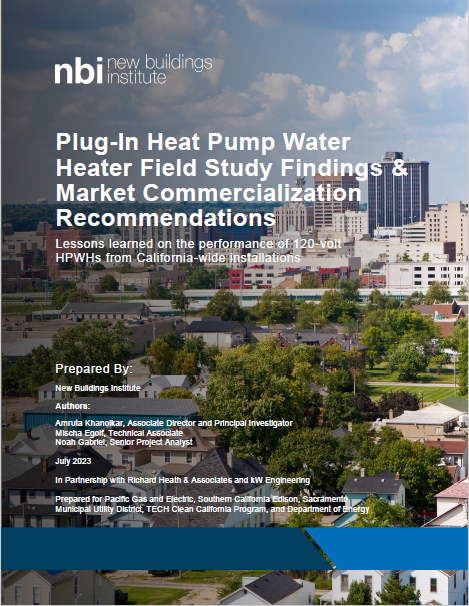
Plug-In heat Pump Water Heater Field Study Findings & Market Commercialization Recommendations
Report / July 12, 2023
Water heating and space heating together account for two thirds of residential energy usage in the U.S. and should be the cornerstones of any plan to decarbonize the built environment. Emerging, plug-in 120-volt heat pump water heaters (HPWHs) are entering…
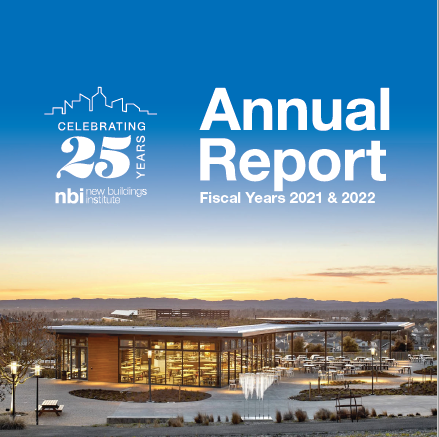
Annual Report 2021 & 2022
Report / January 19, 2023
In 2022, NBI celebrated 25 years of working collaboratively with industry market actors to promote advanced design practices, innovative technologies, public policies, and programs that improve energy efficiency and reduce emissions from the built environment. Our dedicated team of staff,…
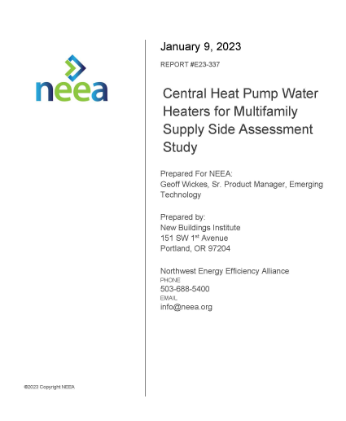
Central Heat Pump Water Heaters for Multifamily Supply Side Assessment Study
Report / January 10, 2023
The Northwest Energy Efficiency Alliance (NEEA) contracted with New Buildings Institute (NBI) in January 2021 to conduct research and outreach to better understand the current landscape of central heat pump water heater (HPWH) adoption in multifamily buildings. Research objectives included…
Carbon Neutral Schools Customizable Templates
Document / April 25, 2022
To accompany the Decarbonization Roadmap Guide, a number of templates have been developed for school districts to customize to their needs in their efforts to decarbonize Carbon Neutral Schools Resolution Template The Carbon Neutral Schools Resolution Template provides a starting…
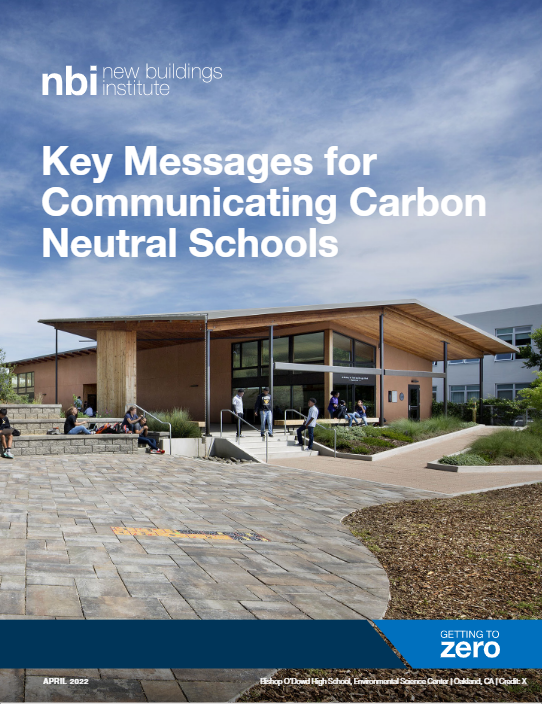
Key Messages for Communicating About Carbon Neutral Schools
Document / April 25, 2022
Effective communication is critical to successfully engage your audience and ultimately achieve your goal of designing, constructing, and operating a zero energy (ZE) school. This document will help you to address key questions around your communication effort and engage stakeholders…

Cost Study of the Building Decarbonization Code
Report / April 13, 2022
This “Cost Study of the Building Decarbonization Code” analyzes the incremental first cost and life cycle cost of two common building types that follow the code language in NBI’s Building Decarbonization Code. The study, which was supported by the Natural…
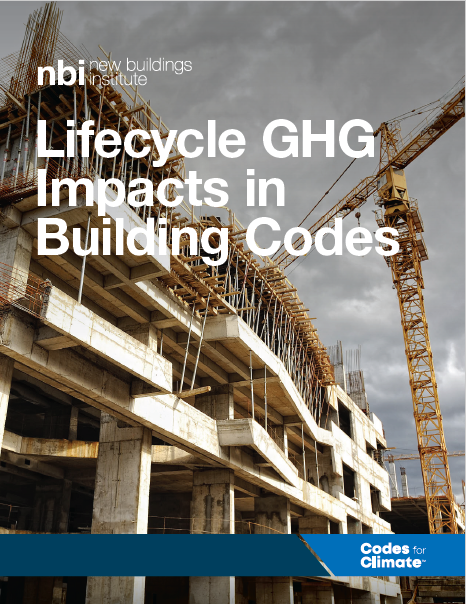
Lifecycle GHG Impacts in Building Codes
Report / January 18, 2022
NBI’s report presents language to incorporate embodied carbon requirements in building codes. Researchers explain the need to address the embodied carbon of the highest emitting materials and the carbon emission benefits for jurisdictions. This report examines the current lack of…
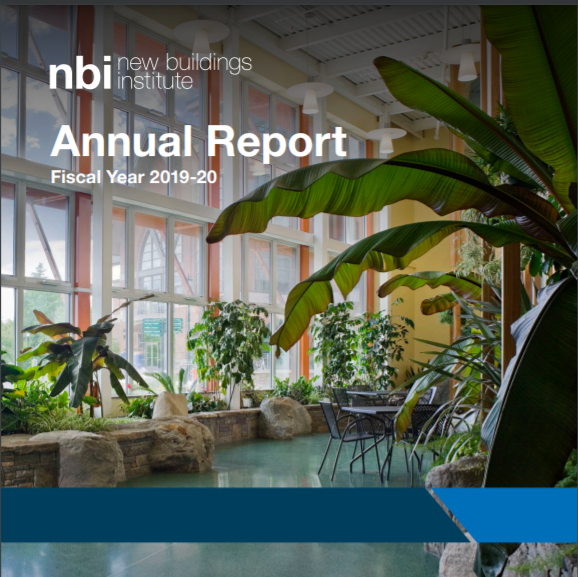
Annual Report 2019-2020
Report / December 17, 2021
NBI is approaching 25 years of commitment to better energy performance in buildings as a way to save energy and money, create more comfortable living and work spaces for all, and now, to urgently decarbonize the built environment in order…
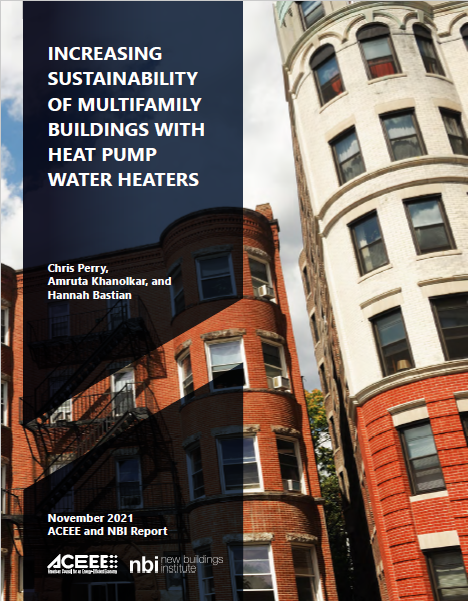
Increasing Sustainability of Multifamily Buildings with Heat Pump Water Heaters
Report / November 18, 2021
From four-unit townhomes to large complexes, multifamily buildings use a significant amount of energy to provide hot water to their occupants. Much of that hot water is provided by natural gas and other fossil fuels, which emit harmful greenhouse gases…
The GridOptimal Buildings Initiative
Paper / October 26, 2021
The role of buildings, renewable energy, and energy storage in the utility industry is changing. New near-term solutions are needed to address today’s challenges and capitalize on opportunities for market transformation. New Buildings Institute, in partnership with the U.S. Green…
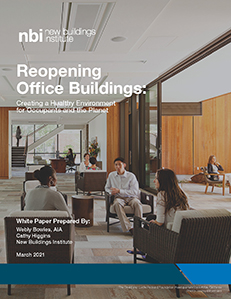
Reopening Office Buildings: Creating a Healthy Environment for Occupants and the Planet
Paper / June 27, 2021
This white paper provides an overview and summary of the multiple building systems that affect occupants’ return to a safe indoor air environment, their energy use implications, and recommendations for best practices. Included is Retrofit and Reopening Recommendations for Offices—a…
Solving for the 11% embodied carbon in the built environment
Webinar / June 25, 2021
As clean energy policy and practice ratchet down operational carbon emissions in the built environment, embodied carbon becomes a larger share of buildings’ carbon footprint. In this webinar, participants will learn about primary sources of carbon embedded in the manufacturing…
Existing Building Retrofits: An integrated solution set for energy and occupant benefits
Webinar / June 22, 2021
Today’s work environment is rapidly changing. Keeping it comfortable and controllable with the latest technology helps occupant experience, tenant retention, reduces energy costs, and provides operators with flexibility and detailed space utilization data. The Integrated Technologies for Energy-efficient Retrofits (INTER)…
Getting to Zero: Grid-Integrated Buildings
Webinar / April 29, 2021
The role of buildings and the grid is changing as historic grid infrastructure strains to handle more centralized and distributed renewable resources, electric vehicles, and smart systems. Growing trends toward all-electric technology deployment further challenge grid health. But solutions are…
Industry Titans Roundtable – Getting to Zero in the Building Sector by 2030
Webinar / April 22, 2021
Zero energy and carbon neutral pledges from leading building industry organizations are accelerating the AEC community toward zero. US Green Building Council, ASHRAE, Urban Land Institute, World Business Council for Sustainable Development, and other industry titans have committed to progressing…
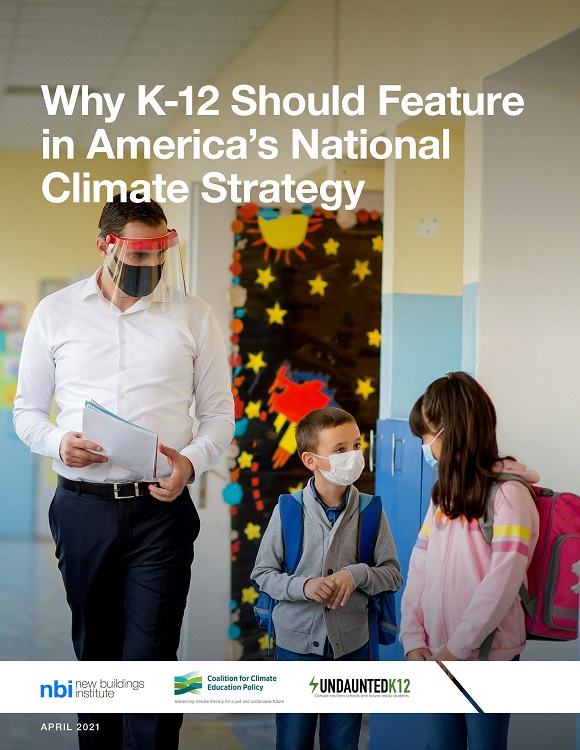
Why K-12 Should Feature in America’s National Climate Strategy
Paper / April 21, 2021
This white paper by UndauntedK12, New Buildings Institute, and the Coalition for Climate Education Policy offers a national perspective on the urgent role that our K-12 sector must play in our national climate strategy. In particular, we urge state and…
Getting to Zero: Buildings Case Study Jam
Webinar / March 25, 2021
Prime examples of net zero buildings are found across the country and total over 700 verified and emerging projects, according to NBI tracking. This webinar features some of the best buildings to date with a Case Study Jam format that…
The Technical Basis of Building Performance Standards
Paper / March 19, 2021
As leading cities and states seek to meet their aggressive climate, energy, and decarbonization goals, they are turning increasingly to mandatory policies that require improved energy and emissions performance across their existing building stock. The most comprehensive of these policies…
It’s Getting BETR: The Building Electrification Technology Roadmap is Here
Webinar / February 25, 2021
Building electrification technologies are potential game changers for getting to zero in the built environment. Listen to NBI’s Cathy Higgins and Alexi Miller and NBI Senior Fellow Alexis Karolides from Point Energy Innovations to learn about new research on market-ready…
Advanced Water Heating Initiative Playbook and 2020 Progress
Webinar / February 11, 2021
Water heating is the second largest energy use in U.S. homes. Heat Pump Water Heaters (HPWHs) are a decades-old, proven technology, and are two to four times more efficient than electric resistance or standard gas water heaters. HPWHs support a…
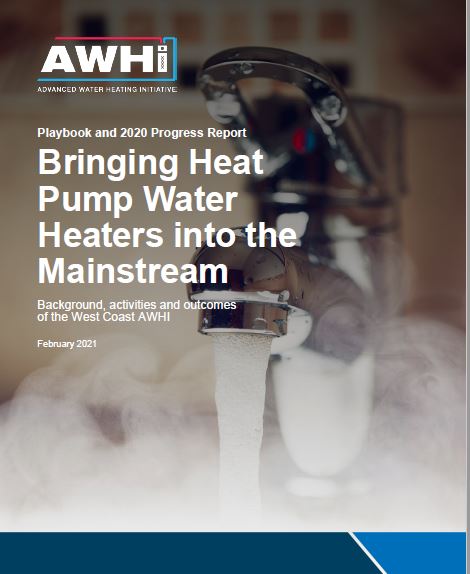
Bringing Heat Pump Water Heaters into the Mainstream
Report / February 10, 2021
The Advanced Water Heating Initiative (AWHI) Playbook and 2020 Progress Report summarizes the activities of AWHI through the end of 2020. The West Coast AWHI has made tremendous progress in the two years it has been underway. The Initiative includes…
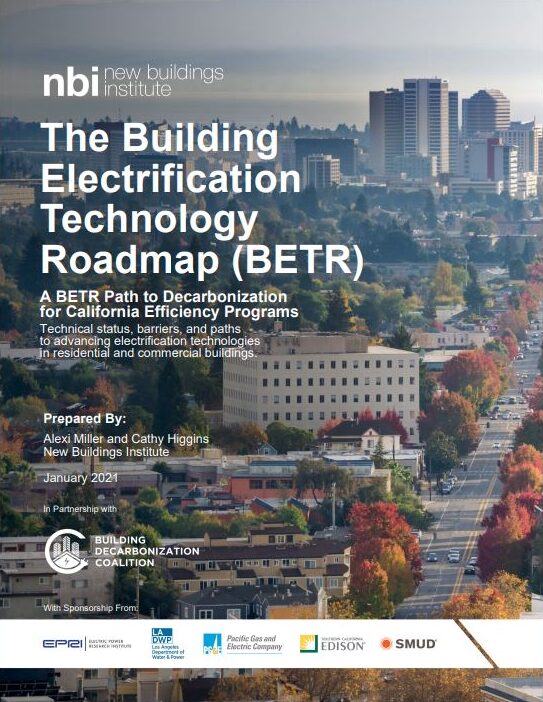
The Building Electrification Technology Roadmap
Paper / February 2, 2021
The Building Electrification Technology Roadmap (BETR) is a guide for utilities and other organizations developing, implementing, and supporting electrification technology programs as a way to advance high efficiency technologies, reduce GHG emissions, and improve public health. It’s the first study…
Getting to Zero: Carbon Neutral Codes
Webinar / January 28, 2021
For decades, U.S. building energy codes have centered on kilowatt-hour savings in buildings. But urgency on climate change is pressing us to rapidly address and mitigate carbon and other greenhouse gas emissions from the built environment, which is responsible for…
Strategic Plan Summary
Document / January 14, 2021
In this 2-page summary, learn about NBI's overarching themes, organizational objectives, program areas and more.

Building Electrification Technology Roadmap
Paper / January 12, 2021
The Building Electrification Technology Roadmap (BETR) is a guide for utilities and other organizations developing, implementing, and supporting electrification technology programs as a way to advance high efficiency technologies, reduce GHG emissions, and improve public health. It’s the first study…
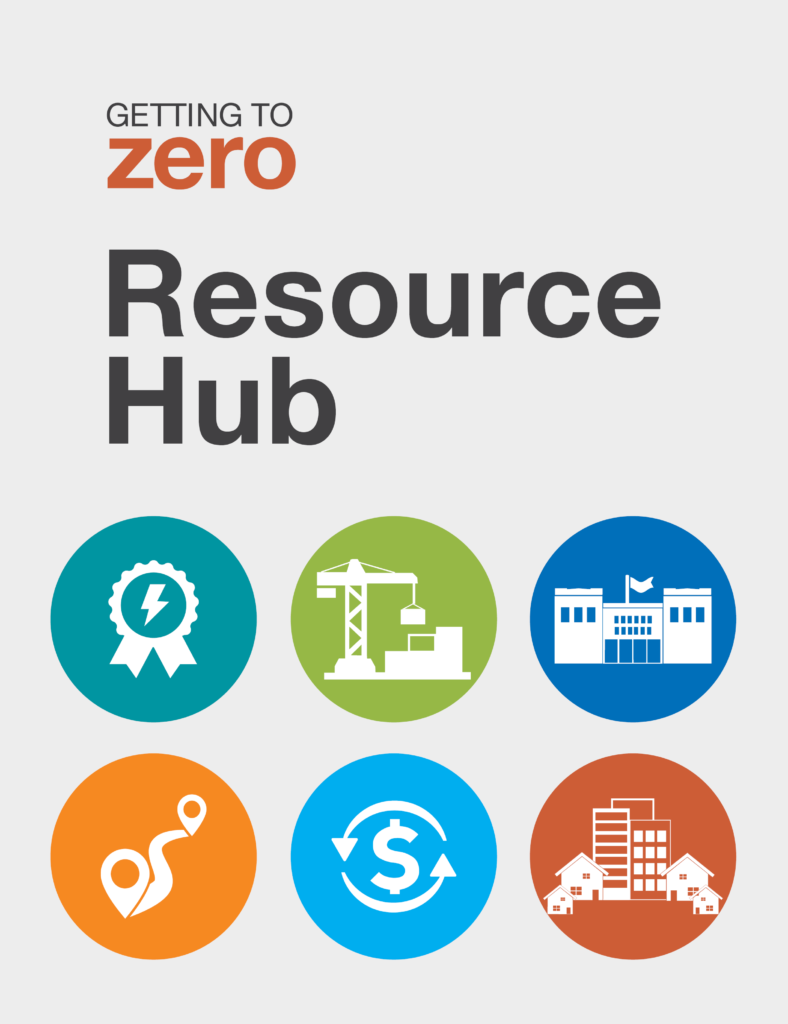
Getting to Zero Resource Hub
Document / January 8, 2021
The Getting to Zero Resource Hub is home to over 300 resources on zero energy and carbon neutral buildings including guides, models, research, case studies, educational webinars, and more. Categories cover design and development, codes and policy, residential buildings, embodied…
Zero Net Energy Residential Forum
Webinar / December 15, 2020
In this National Grid webinar, residential designers present zero net energy projects involved in the National Grid Rhode Island zero net energy pilot program. New Buildings Institute details the process, technologies, and strategies needed to achieve deep energy savings and…
Zero Net Energy Commercial Forum
Webinar / December 8, 2020
This National Grid webinar features commercial case study projects with deep energy savings and zero net energy designs. Hear about the progress regional architecture firms are making in meeting the American Institute of Architects (AIA) 2030 Commitment and find out…
Getting to Zero in Affordable Multifamily Buildings
Webinar / December 3, 2020
NBI's Getting to Zero webinar series provides ongoing opportunities for knowledge sharing around actionable solutions to drive the highest levels of efficiency in buildings. Low-income communities are most at risk of being left behind as local jurisdictions pursue ambitious carbon…
Decarbonization Technologies: What We Have, What We Need
Webinar / October 29, 2020
Best of the Forum on-demand webinar: Take stock of the current state of the building technologies needed to drive decarbonization at scale. In this webinar, moderated by Clay Nesler, a report is provided on Johnson Controls' recent Energy Efficiency Indicator…

2020 Midwest Getting to Zero Buildings List
Document / October 22, 2020
The 2020 Midwest Getting to Zero Buildings List tracks commercial and multifamily zero energy (ZE) building projects across 13 states, including: Illinois, Indiana, Iowa, Kansas, Kentucky, Michigan, Minnesota, Missouri, Nebraska, North Dakota, Ohio, South Dakota, and Wisconsin. This inaugural Buildings…
Decarb for a New Tomorrow
Webinar / October 20, 2020
Natural gas accounts for over 50% of the recent carbon dioxide growth in the past few years, leading some policymakers to look at building decarbonization to meet local climate goals. Designers are seeking new technologies to reduce carbon and meet…
Planning and Design for Getting to Zero in Schools
Webinar / October 8, 2020
Zero energy school construction is a growing trend across the country. An innovative combination of internal and external champions, integrated design, energy efficiency management strategies and renewable energy is making these possible at little to no extra cost. The key…
The Getting to Zero Market Landscape and 2020 Getting to Zero Buildings List
Webinar / September 24, 2020
On-demand webinar: NBI has been tracking the zero energy building sector for over a decade and our annual Zero Energy Buildings List was recently released with nearly 700 zero energy verified and emerging buildings being tracked! In this webinar, NBI’s Alexi Miller and…
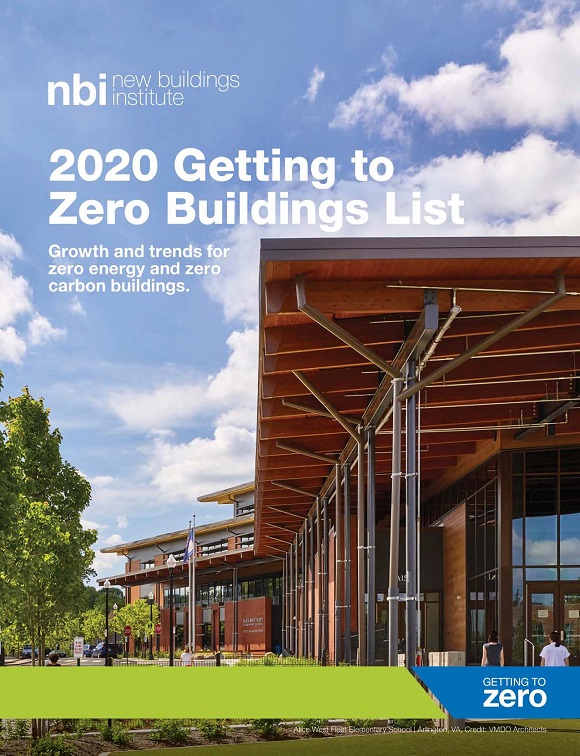
Getting to Zero Buildings Lists
Document / September 24, 2020
NBI's 2020 list of pioneering zero energy (ZE) projects represents the latest growth in a rapidly expanding market. For this list, ZE buildings are extremely energy efficient, with a median site EUI of only 23 kBtu/sf/yr*, and consume only as…
Public Buildings Portfolio Management Strategic Energy Plan Template
Document / July 23, 2020
Strategic energy planning helps local governments and other organizations increase the energy efficiency of buildings, save on operating costs, reduce emissions, and lead by example for the community. The Public Buildings Portfolio Management Plan Template can be used by cities,…

GridOptimal Phase 2 Outcomes
Report / July 19, 2020
The role of buildings, renewable energy, and energy storage in the utility sector is changing. New near-term solutions are needed to address today’s challenges and capitalize on opportunities for market transformation. New Buildings Institute (NBI), in partnership with the U.S.…
Codes and Policies to Advance Zero Goals: Policies for Retrofits and New Construction
Webinar / June 18, 2020
This is a Best of the Forum session. States and local governments are actively developing policy approaches aimed at driving towards zero energy and/or zero carbon new buildings and deep emission reductions for existing buildings. Across jurisdictions, successful strategies involve…
National Grid Zero Net Energy Spring Forum: Policy
Webinar / June 2, 2020
The National Grid Zero Net Energy Spring Forum Policy Webinar features experts on leading ideas and policies from regional jurisdictions. Topics include stretch codes, innovative programs, and incentives that will support owners and project teams. Join local and regional professionals…
National Grid Zero Net Energy Spring Forum: Design
Webinar / May 19, 2020
The National Grid Zero Net Energy Spring Forum Design Webinar features local technical experts who highlight case study projects that feature deep energy savings and net zero design. Join local and regional professionals who are interested in learning methods to…
A Deeper Dive into Zero Net Carbon Schools
Webinar / May 18, 2020
Building on the overview provided in the Zero Net Carbon Schools webinar hosted on April 1, 2020, this 2-hour webinar took place on May 14, 2020. We took a deeper dive into the technical aspects of the process, spheres of…
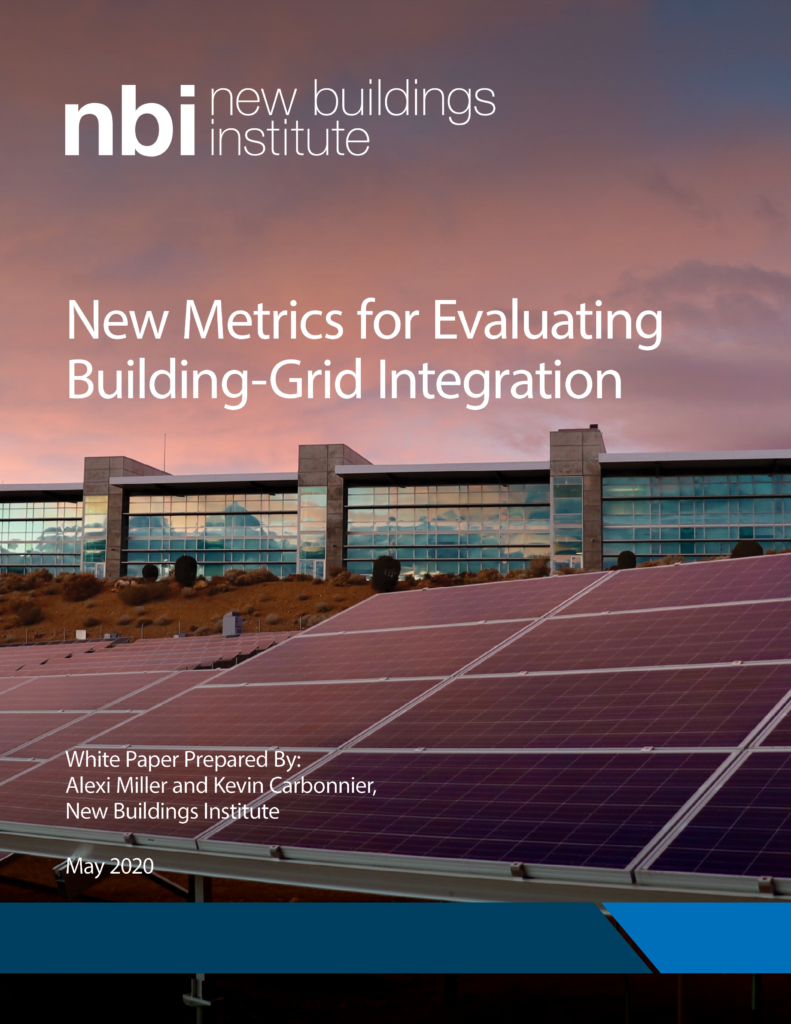
New Metrics for Evaluating Building-Grid Integration
Paper / May 18, 2020
Since mid-2018, the not-for-profit, multi-stakeholder GridOptimal Buildings Initiative (GridOptimal 2020) has been developing metrics to measure the grid impacts of building features and operating characteristics to support a new design approach that prioritizes better building-grid integration across the building stock.…
Advanced Water Heating Initiative
Document / May 8, 2020
The Advanced Water Heating Initiative (AWHI) is a collaborative, market transformation effort of over 35 organizations working to catalyze a rapid transition to high-efficiency, grid-connected Heat Pump Water Heaters (HPWH). AWHI is an initiative of New Buildings Institute and the…
Taking the (Fuel) Blinders off Energy Codes Part 2: Metrics and Mechanics in the Modern Era
Paper / March 26, 2020
This paper follows upon a recently published paper examining how climate policy now impacts energy code policy. A variety of drivers, including greenhouse gas emission goals, regulation, market forces, and new technologies, is changing the relationship between buildings and the…
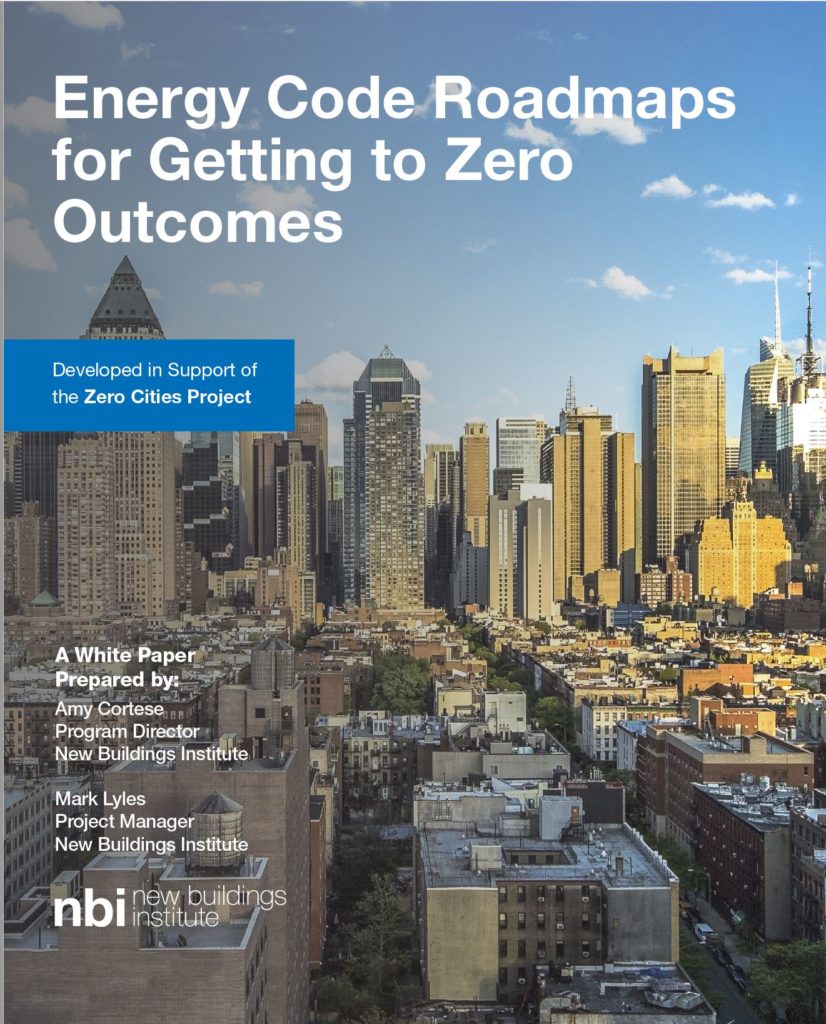
Energy Code Roadmaps for Getting to Zero Outcomes
Paper / February 20, 2020
Advanced energy codes are an important policy mechanism to advance energy efficiency and integrate renewables into the built environment. Energy code roadmaps lay the groundwork by identifying the order and priorities necessary for subsequent code improvements on the path to…
GridOptimal: Outcomes and Lessons Learned from the First Pilot Project
Webinar / January 30, 2020
This is a Best of the Forum session. AIA credits for this course are available until 1/14/2023. The role of buildings in the grid is changing as historic grid infrastructure strains to handle more centralized and distributed renewables, electric vehicles,…
Putting Data to Work: Using Monthly Data From Benchmarking Programs
Report / January 27, 2020
This guide from the Institute for Market Transformation (IMT) provides an overview of the powerful ways in which monthly building consumption data can yield new insights, and how these insights can help cities to design more effective targeted programs.
NBI’s December Newsletter
Document / January 14, 2020
Read our December 2019 newsletter for a variety of energy related news, including: 2021 IECC, San Jose’s Reach Codes, NBI Fellows, Zero Carbon buildings, Passive House, California's ZNE Leadership Award winners, a new White Paper on Zero Energy Performance Targets,…
Getting to Zero Energy in Schools is Achievable! Stories from schools on the path to zero
Webinar / December 17, 2019
This one-hour webinar will highlight two projects that demonstrate the proof-of concept in zero energy school construction: P.S. 62 – the Kathleen Grimm School in Staten Island, NY and John J. Sbrega Health & Science Building at the Bristol Community…
Student Innovation and Initiatives Driving Zero Energy Adoption
Webinar / December 5, 2019
A critical element in any effort to promote a low carbon world is the engagement of all users and stakeholders in the mission. Across the world students are demanding action to reduce the threats of climate change. To engage our…
Help NBI Spread the Word
Document / December 3, 2019
CALL FOR PROJECTS: New Buildings Institute (NBI) invites designers, builders, developers and owners of zero energy and low energy commercial buildings to submit their projects to the Getting to Zero Buildings Database. The database represents North America’s most comprehensive listing…
Overview of the Lighting System Requirements of the 2019 Oregon Commercial Energy Code
Webinar / November 12, 2019 / Energy Codes
The one-hour session will provide an overview of the new building lighting system requirements. The focus of this session will be on the new lighting power density requirements, a discussion on the new lighting control requirements and how to determine…
Overview of the Building Envelope Requirements of the 2019 Oregon Commercial Energy Code
Webinar / November 12, 2019 / Energy Codes
The one-hour session will provide an overview of the building envelope provisions of the OCEC including the updated building envelope R-value/U-factor requirements, continuous air barrier requirements, and other significant changes between the current OEESPC and the 2019 OCEC. Available compliance…
Overview of the Commercial Mechanical Provisions of the 2019 Oregon Commercial Energy Code
Webinar / November 11, 2019 / Energy Codes
This one-hour session will provide an overview of the HVAC requirements for typical Oregon buildings and focus the training on provisions that have a significant impact on the energy use of the building. Available compliance options will be discussed.
The IECC Process Explained: A Guide for Voters
Webinar / November 6, 2019
Are you planning to vote in the 2021 International Energy Conservation Code update this November? If you’re new to the process, watch this free webinar to learn about the 2021 IECC update process. During this 90-minute session, our team of…
Overview of the 2019 Oregon Commercial Energy Code (OCEC) Commercial Provisions
Webinar / October 22, 2019
This one-hour session will provide an overview of the HVAC requirements for typical Oregon buildings and focus the training on provisions that have a significant impact on the energy use of the building. Available compliance options will be discussed.
Top 2021 IECC Efficiency Proposals for Northwest Voters
Webinar / October 15, 2019
Learn about the top energy efficiency proposals under consideration in the 2021 International Energy Conservation Code (IECC) update process — including those with the most potential to impact new buildings located in the Pacific Northwest climate. During this 60-minute session,…
An Important Vote for the Climate: 2021 IECC Proposals To Know About
Webinar / September 19, 2019
Watch this webinar on the 2021 International Energy Conservation Code (IECC) update process. During this 90-minute session, experts will outline the best opportunities for achieving substantial energy savings that will have decades-long impacts on the energy performance of residential and…
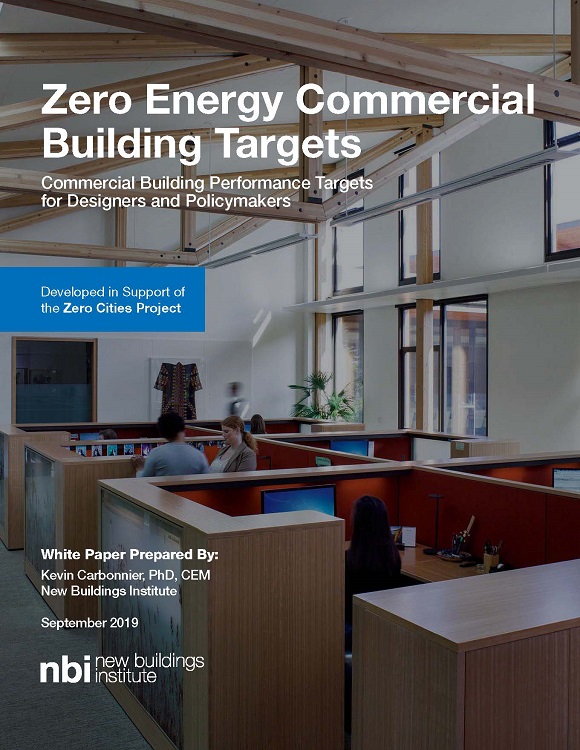
Zero Energy Commercial Building Targets
Paper / September 9, 2019
The critical first step in achieving a zero energy building is to set an energy use target. This Zero Energy Commercial Building Targets white paper helps define appropriate goals for these ultra-low energy buildings, which often surpass even the most…
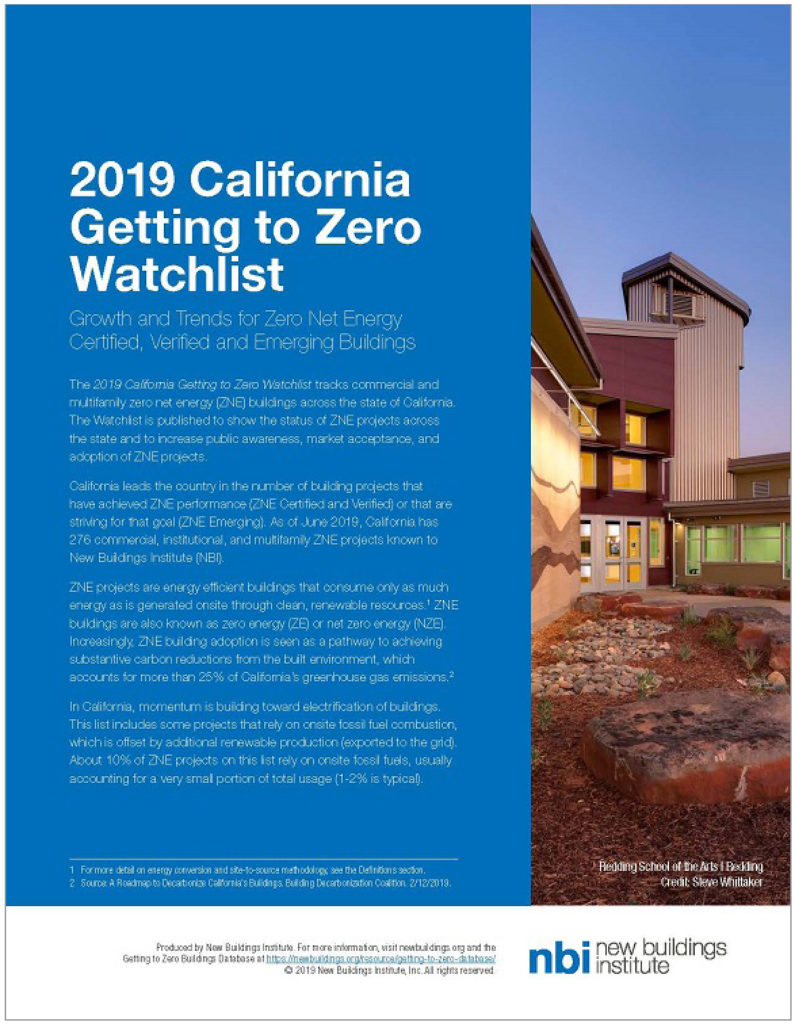
California Getting to Zero Watchlists
Document / August 29, 2019
NBI uses its extensive buildings data set to develop specialized Buildings Lists focused on a particular region or building type to help increase public awareness, market acceptance, and adoption of zero energy projects. California leads in zero energy buildings and…
Gaining Momentum on Efficiency: Next Steps in the 2021 IECC Update
Webinar / June 25, 2019
Hear about the status of residential and commercial energy efficiency proposals for the 2021 International Energy Conservation Code (IECC) in this webinar. This 90 minute session will feature experts explaining the outcomes from the recent International Code Council Committee hearings…
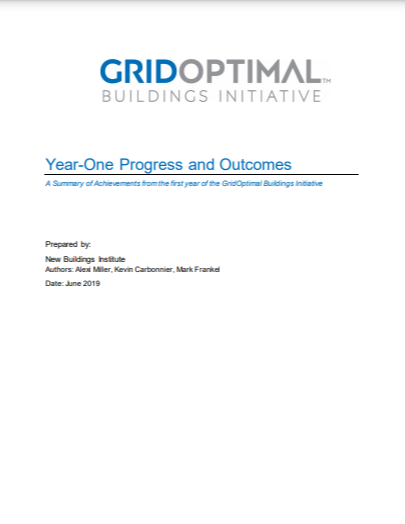
GridOptimal Phase 1 Outcomes
Document / June 19, 2019
The role of buildings, renewable energy, and energy storage in the utility sector is changing. New near-term solutions are needed to address today’s challenges and capitalize on opportunities for market transformation. New Buildings Institute (NBI), in partnership with the U.S.…
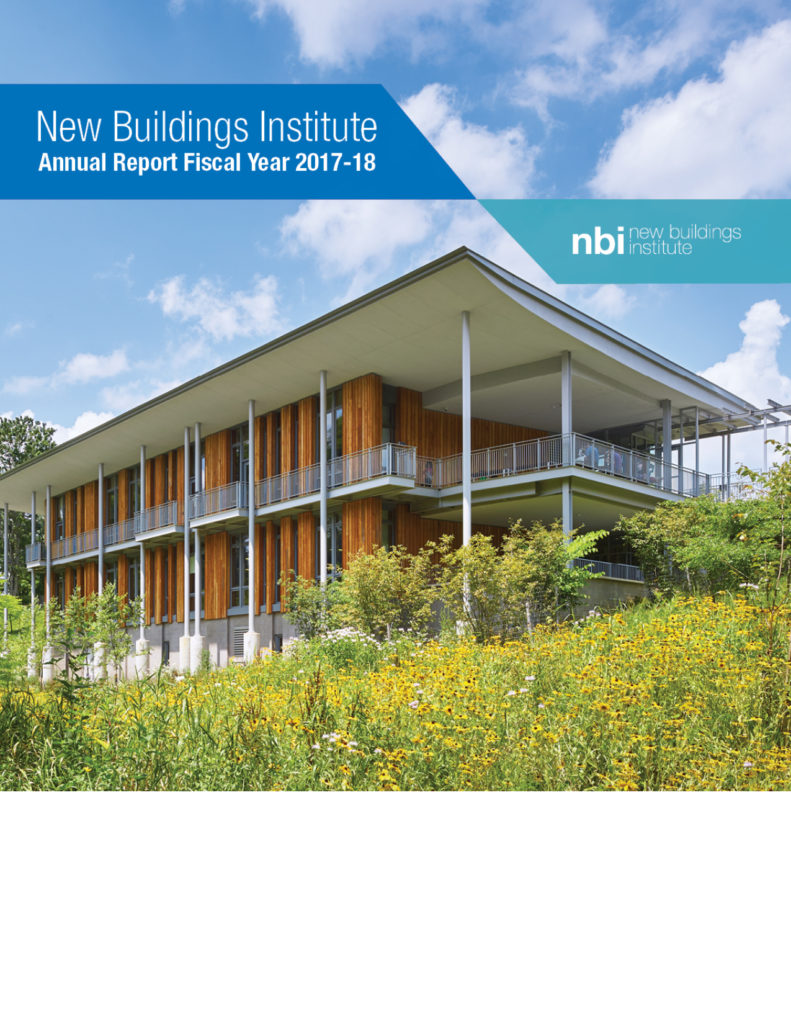
Annual Report 2017-2018
Report / June 11, 2019
In 2017, NBI celebrated its 20th anniversary marking steadfast progress in achieving market transformation toward improved energy efficiency in the built environment. Our founders envisioned a new organization that would be dedicated to advancing codes, conducting research, and developing guidance…
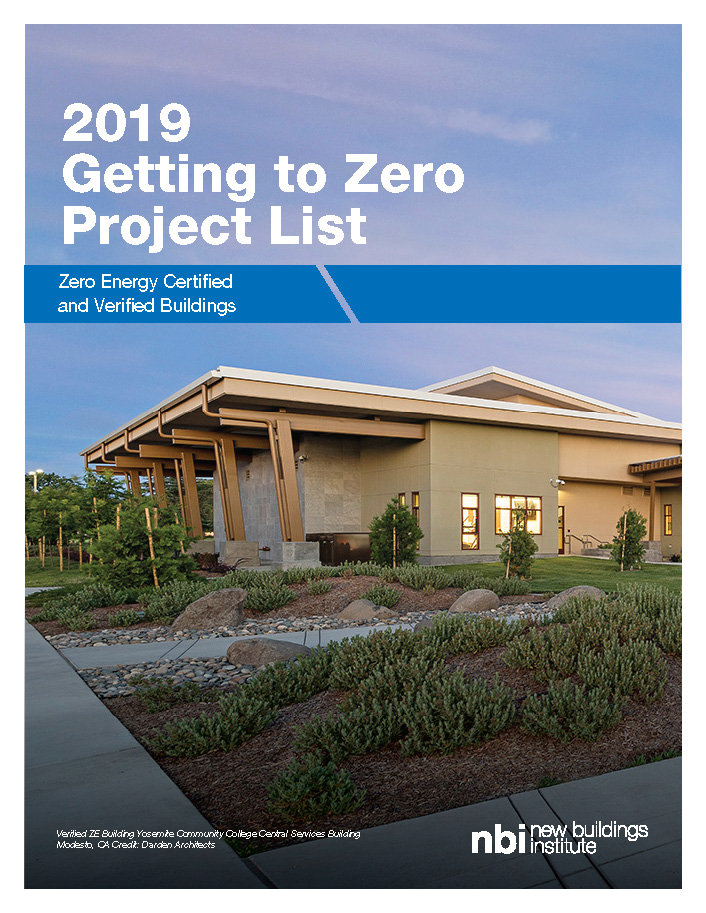
2019 Getting to Zero Project List
Document / May 8, 2019
The 2019 Getting to Zero Project List tracks commercial and multifamily zero energy (ZE) projects across North America where ZE performance has been certified by a third party or verified by NBI. The trailblazing projects in this list have achieved…
Getting to Zero Buildings Count and Trends for 2019
Webinar / May 8, 2019
Targets for zero energy and zero carbon outcomes are growing exponentially. Recently, Grand View Research Inc. forecast $78.8 billion of growth in the global zero energy (ZE) building market by 2025. That’s compared to $8.04 billion in 2016, according to…
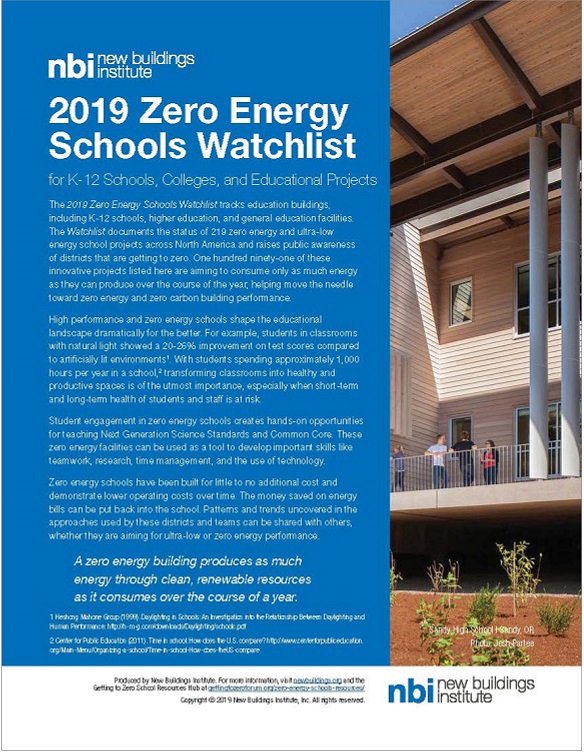
2019 Zero Energy Schools Watchlist
Document / April 24, 2019
The 2019 Zero Energy Schools Watchlist tracks education buildings, including K-12 schools, higher education, and general education facilities. The Watchlist documents the status of zero energy school projects across North America and raises public awareness of districts that are getting…
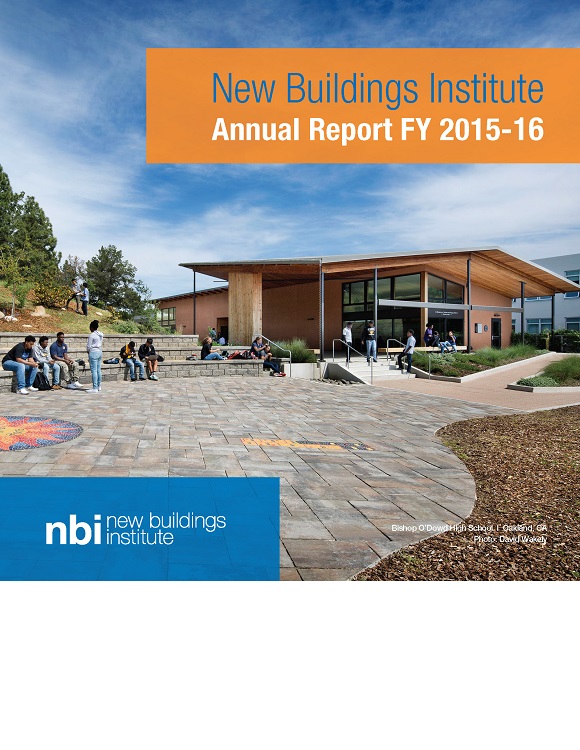
Annual Report FY 2015-2016
Report / April 16, 2019
Increasing building energy efficiency is a process that we at New Buildings Institute have been active in for nearly 20 years. Whether driven by policy mandates, a corporate resolution, or by innovative engineers and architects striving for a better end…
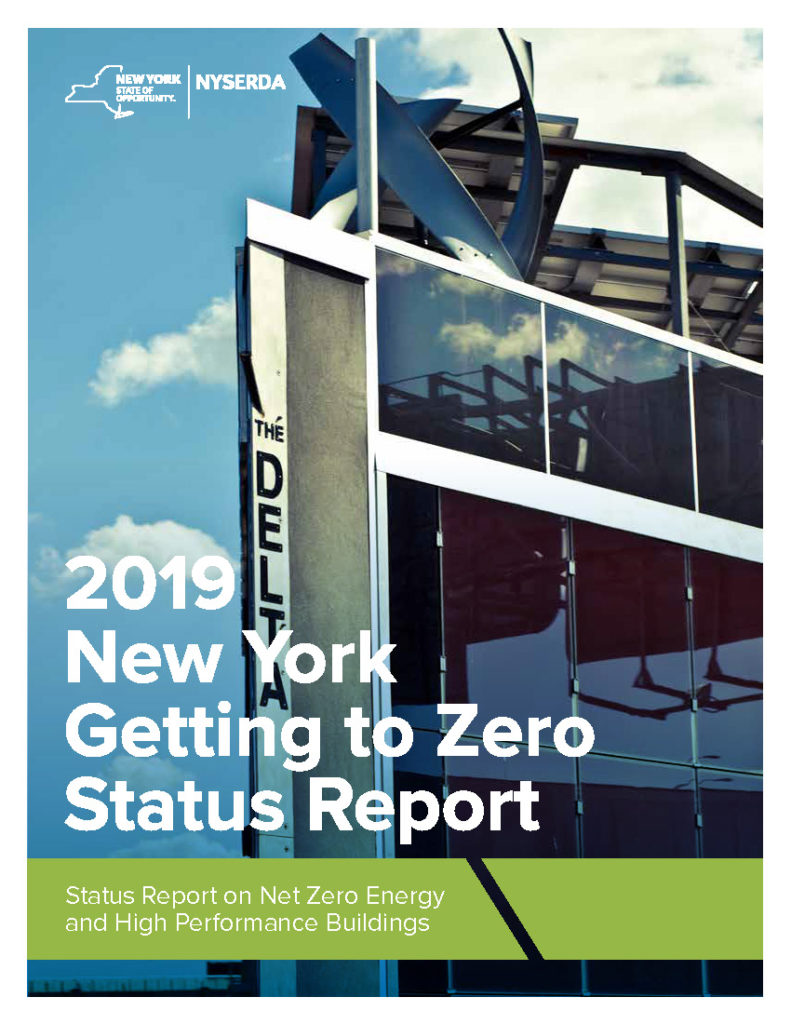
2019 New York Getting to Zero Status Report
Report / April 15, 2019 / Zero Net Energy (ZNE)
The 2019 New York Getting to Zero Status Report is a first-of-its-kind review of the state of the net zero energy buildings market in New York State and provides detailed policy and market context about New York’s leading role in…
Tools for Getting to Zero Energy in School New Construction
Webinar / March 21, 2019
Zero energy schools are indeed possible and don't have to come with a premium price tag! Watch this one-hour webinar focusing on new design guidance that helps school projects cost effectively achieve advanced levels of energy savings. NREL's Paul Torcellini…
Technical proposals putting the 2021 IECC on a glide path to efficiency
Webinar / March 5, 2019
Updating of the 2021 International Energy Conservation Code (IECC) is underway! Watch this free webinar hosted by New Buildings Institute and the Energy Efficiency Codes Council to hear from experts working on the 2021 IECC update. With this webinar you…
The GridOptimal Buildings Initiative Phase 1: Metrics, Modeling, and Momentum
Webinar / February 28, 2019
NBI and USGBC are leading the GridOptimal Buildings Initiative, a collaborative project bringing together a wide range of organizations interested in optimizing building performance to promote grid integration. The GridOptimal project team is developing metrics by which building features and…
Schools are Leading! A Closer Look at Districts Getting to Zero Energy
Webinar / February 14, 2019
Schools are leading the race to zero energy (ZE) construction with over 100 verified and emerging educational buildings across the country. These buildings are low-energy projects that consume only as much energy as they produce from renewable resources. Watch this…

2019 Zero Energy Schools Watchlist
Document / February 13, 2019
The 2019 Zero Energy Schools Watchlist tracks education buildings, including K-12 schools, higher education, and general education facilities. The Watchlist documents the status of zero energy school projects across North America and raises public awareness of districts that are getting…
Leading in LA
Report / December 26, 2018 / Existing Buildings
New Buildings Institute led a major research project funded by the California Energy Commission in response to the critical need to greatly reduce energy use in California’s existing commercial buildings with cost-effective and scalable solutions. Working with prominent energy efficiency…
Northwest Zero Energy Watchlist
Document / December 19, 2018
The Northwest Zero Energy Watchlist tracks commercial and multifamily zero energy (ZE) buildings across the states of Washington, Oregon, Idaho and Montana. The Watchlist is published to show the status of ZE projects in the region and to increase public…
Effective Design Strategies for Optimal Energy Performance and Occupant Comfort and Health
Webinar / December 13, 2018 / Benchmarking & Feedback
With building occupants spending an average of 90% of their time indoors, indoor environmental quality is key to occupant comfort and health and provides a unique opportunity to focus on advancing energy efficiency. This one-hour webinar will present best practices…
Perspectives on the Cost of ZNE Retrofits
Webinar / November 29, 2018
The path to Zero Net Energy (ZNE) school retrofits can be a daunting one. Some issues may seem overwhelming. Teams looking to implement ZNE often ask questions like where do I start? How do you pay for it? Learn from…
Portfolio Energy Benchmarking and Prioritization – Step by Step
Webinar / November 8, 2018 / Benchmarking & Feedback
This one-hour webinar covers the practical realities of benchmarking individual buildings and building portfolios, prioritizing audits, and targeting commissioning and retrofit activities that will optimize portfolio energy performance and occupant comfort.
Zero Carbon/Energy Codes: Key Policy Tools to Meet Climate Goals
Webinar / November 1, 2018
As governments of all scales consider options for meeting deep greenhouse gas reduction goals, attention has turned to how to achieve zero energy or zero emissions from new construction in the building sector, which is responsible for more than 40%…
Mission Possible! Southern California Prop 39 ZNE School Retrofit Pilot Case Studies
Webinar / October 23, 2018
This one-hour webinar highlights two ZNE school retrofit projects – one at a district scale and another at a community college. Featured projects include Garden Grove School District and San Bernardino Community College. Viewers will advance their knowledge of the…
DCAM-18-AE-0125 Architect / Engineer Services for West Elementary
Document / September 18, 2018
The District of Columbia (“District”) Department of General Services (“DGS” or “Department”) on behalf of the District of Columbia Public Schools (“DCPS”) is issuing this Request for Proposals (“RFP”) to engage a design firm to serve as the Architect/Engineer (“A/E”)…
National Grid Presents — Turn Building Benchmarking Data Into Actionable Information
Webinar / September 18, 2018 / Measured Results
Cities around the region, including Boston and New York City, require reporting and tracking of benchmarking data. Other cities are embarking on voluntary benchmarking programs to build a more animated energy market. This webinar will show you how to turn…
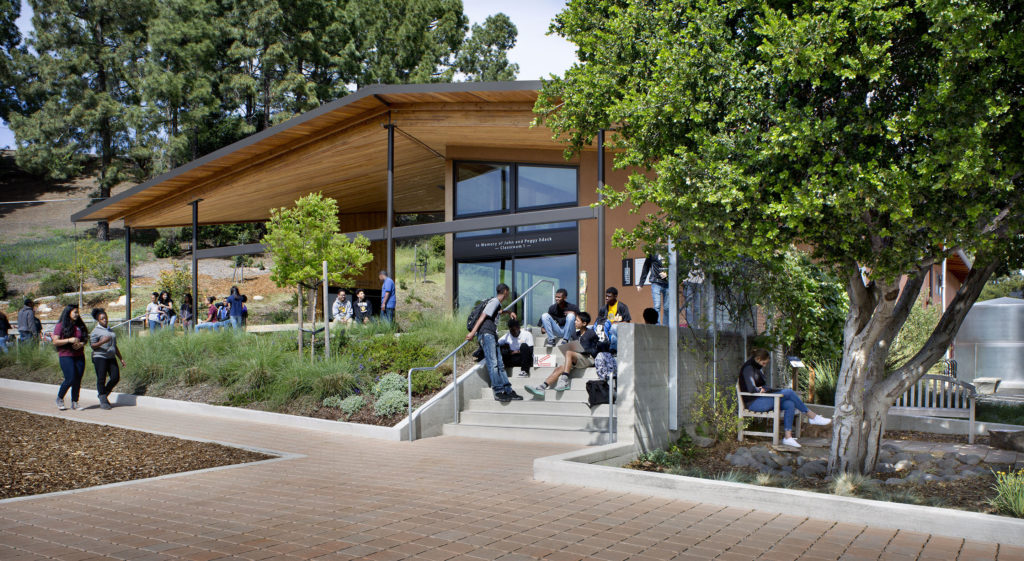
Zeroing in on Schools
Paper / August 27, 2018
This paper from the 2018 ACEEE Summer Study presents completed national research about decision-making, funding and energy practices in the K-12 schools new and existing buildings market. The paper confirms the obvious, that educational outcomes and student performance are the…
Energy Efficiency Savings Up in Smoke: The Budding Impact of Indoor Agriculture and Cannabis Production
Document / August 27, 2018
This poster was presented by NBI staff at the 2018 ACEEE Summer Study. Indoor horticulture energy usage is projected to grow substantially over the next several years, driven in large part by the legalization of medical and recreational cannabis. How…
Radiant Solutions: Energy Findings from the Largest Study of Commercial Buildings with Radiant Cooling and Heating System
Document / August 27, 2018
This poster about energy efficiency advantages of radiant cooling was presented by NBI staff at the 2018 ACEEE Summer Study. Buildings with radiant cooling have similar comfort and use less energy. Learn more about how with this resource.
Stretch Codes on the Road to Zero Energy – Potholes and Speed Traps Ahead
Paper / August 27, 2018
This paper details how a range of stretch code efforts, working in parallel, contribute to the overall progress in energy savings, with many current stretch codes targeting 20% energy savings from ASHRAE 90.1-2013/2015 IECC. It also explores how stretch codes…
Taking the (Fuel) Blinders off Energy Codes
Paper / August 27, 2018
Amidst a backdrop of the Arab Oil Embargo of 1973 and a perception of physical limits on energy resources, the obvious policy imperative of a new generation of energy codes was to reduce the use of all types of energy.…
Dreaming the Future: How Zero Net Energy Design Can Transform the School Environment
Webinar / June 13, 2018 / Existing Buildings, HVAC
Education is rapidly emerging as a leading sector among zero net energy (ZNE), high performance buildings. ZNE schools are highly efficient buildings that can meet all their energy needs with on-site renewable resources. Studies show that classrooms with sustainable attributes…
Prop 39 ZNE School Retrofit Pilot Case Studies
Webinar / May 31, 2018 / Existing Buildings
This one-hour webinar will highlight two projects that demonstrate the proof-of concept in ZNE school retrofits: Newcastle Elementary School and Los Osos Middle School. Attendees will advance their knowledge of the stakeholder engagement, building assessment, design process, and technology applications…
Analyzing City Benchmarking Data with the DOE Asset Score Tool
Webinar / May 22, 2018
Under a cooperative agreement with the US Department of Energy (DOE) through the Cities Leading through Energy Analysis and Planning (Cities-LEAP) project, the City of Portland has been exploring strategies to leverage annual benchmarking and disclosure data with the use…
Nothing beats Zero–Updates on the Trends and Projects that are Getting to Zero Energy
Webinar / March 6, 2018
Zero energy (ZE) buildings are a tiny part of the market but their growth trend is steep and practitioners and policies are accelerating their adoption nationally. Watch this webinar to learn the latest from NBI’s 2018 Getting to Zero Buildings…
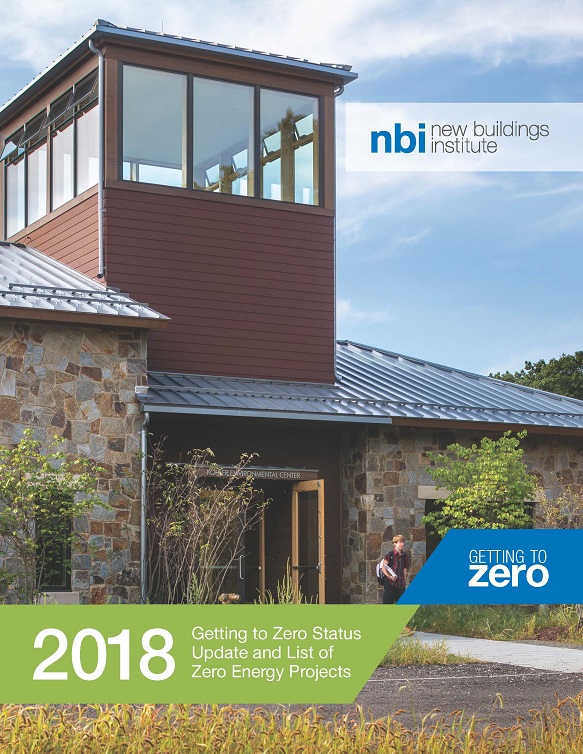
2018 Getting to Zero Status Update
Report / January 23, 2018
We are pleased to share the 2018 Getting to Zero Status Update and Zero Energy Buildings List, which summarizes the growth and trends from nearly 500 certified, verified and emerging zero energy projects across the United States and Canada. In…
The 20% Stretch Code: A New Energy Standard for Cities and States
Webinar / December 7, 2017
To help local jurisdictions advance on energy and climate action goals, New Buildings Institute (NBI) has developed a new model stretch code that targets 20% better efficiency than the ASHRAE 90.1-2013 national model energy code. The new 20% Stretch Code…
California K-12 and Community College Zero Net Energy Retrofit Readiness Study
Report / November 17, 2017
The California K-12 and Community College Zero Net Energy (ZNE) Retrofit Readiness Study provides recommendations to California Program Administrators and other key market actors on how to best stimulate and enable the public school market to meet California’s aggressive ZNE…
National Grid Presents—Benchmarking 102
Webinar / October 12, 2017
Part II of this two-part webinar covers how to build on the basic benchmarking covered in Part I. It will identify the strategies and tools that can be used to take basic benchmarking information and build on it so that…
National Grid Presents—Benchmarking 101
Webinar / September 28, 2017
This session covers the step-by-step process of gathering and entering the required benchmarking data into ENERGY STAR Portfolio Manager.
ZNE Schools Retrofit Readiness
Webinar / September 28, 2017
This webinar shares the findings of a recent study, commissioned by the California Public Utilities Commission and conducted by NBI, that identifies opportunities for K-14 schools to achieve a zero net energy (ZNE) performance. NBI investigated decision-making patterns and funding…
National Grid Presents — Office Worker Performance and the Indoor Environment
Webinar / August 31, 2017
Offices pose a unique opportunity for advancing energy efficiency. With relatively consistent activities and energy loads, energy efficiency strategies can be highly targeted for maximum effectiveness. This webinar presents best in class approaches to improving energy efficiency in offices. It…
Energy Performance of Commercial Buildings with Radiant Heating and Cooling
Report / August 10, 2017 / HVAC
This report is part of the California Energy Commission (CEC) EPIC project (EPIC-14-009), Optimizing Radiant Systems for Energy Efficiency and Comfort. The main goal of this research was to determine the building characteristics of projects with radiant heating and cooling…
National Grid Presents — Tools and Design Strategies of Resilient Buildings to Achieve Zero Energy
Webinar / July 13, 2017
Buildings provide fundamental services that allow our society to function every day including comfortable indoor conditioned environments with lighting, ventilation and temperature control. Natural hazards, including severe storms, earthquakes and wildfires, can cut off energy supplied to these buildings, disrupting…
Federal Preemption as a Barrier to Cost Savings and High Performance Buildings in Local Energy Codes
Paper / June 22, 2017
This white paper from New Buildings Institute (NBI) looks at the impacts of federal rules on efficiency standards for appliances, water heating and HVAC equipment and lays out possible solutions from an examination of policies from around the world. Decades-old…
ZNE Action Bulletin, Spring 2017
Document / June 2, 2017
Find the latest in ZNE news here. Included in this issue: Lancaster adopts new ZNE home ordinance that expands on solar requirements, California legislation would require more than solar-ready roofs, Decathlon program focuses on ZNE buildings, SFUSD honored with transformation…
Risks and Rewards in the ZNE Marketplace
Webinar / March 30, 2017
What value is derived to owners and developers from a zero net energy building? This webinar will explore and understand the developer and owner perspectives on investor value of zero and take a close look at income, cost, and risk.…
New Construction Guide Errata
Document / March 22, 2017
Updates and errata for the 1.01 print edition of the New Construction Guide are available here. The errata and updates were produced as drop-in cut sheets that can be printed and added to your guide.
Planning for Districts and Urban Environments
Webinar / February 23, 2017
Campuses and districts are growing trend in the ZNE marketplace. This webinar will examine the opportunities offered by large-scale developments including real-world examples from projects in Pittsburg and Denver. Challenges presented by dense, urban environments will be spotlighted with analysis…
Zero Net Energy Building Trends and ZEDx Presentations
Webinar / February 1, 2017
New Buildings Institute (NBI) recently completed its annual list of ZNE verified and emerging buildings and hosted a free webinar to share the trends identified through study of these model projects. NBI Research Director Cathy Higgins joins several industry experts…
ZNE Action Bulletin, Winter 2017
Document / January 31, 2017
Find the latest in ZNE news here. Included in this issue, anticipating a state executive order mandating that state facilities be ZNE starting in 2025, the California State Lottery Santa Fe Springs office tested various ZNE design choices in the…
Introducing SmartScale: a no-cost online implementation guide & toolkit for small commercial retrofit program planners and implementers
Webinar / December 15, 2016
Ecology Action and New Buildings Institute present SmartScale, a cost effective deep retrofit program for small and medium commercial buildings designed for replication in a wide-range of markets across the country. Market-tested with one of the largest municipal electric utilities,…
California ZNE Watchlist, Winter 2016
Document / December 12, 2016
This resource tracks zero energy and ultra-low energy commercial buildings in California, including multi-family. Information was gathered by NBI from multiple sources that include: designers, owners, utility programs, private and public organizations, articles, e-news, research and commercial real estate professionals.…
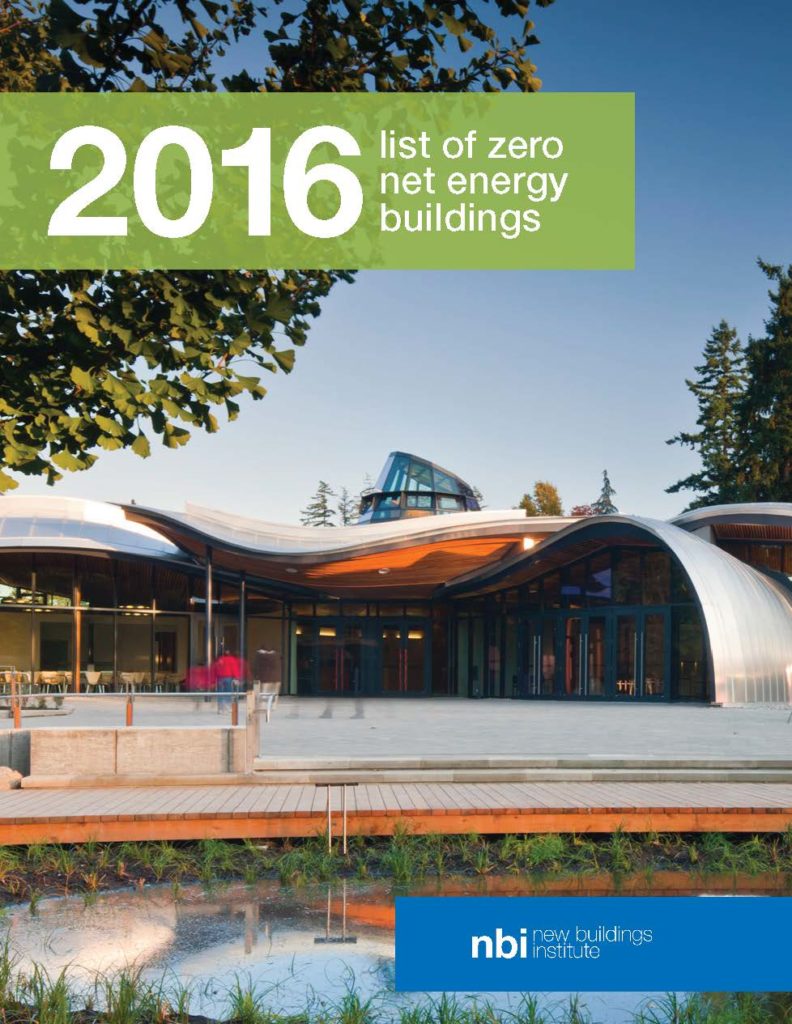
List of Zero Net Energy Buildings
Report / October 13, 2016
NBI is home to the most extensive data set on zero energy, low-carbon buildings in the world. We regularly publish Getting to Zero Buildings Lists that show growth and market trends for zero. The lists for 2015, 2016 and 2018…
NBI’s 2018 IECC Proposals
Webinar / October 4, 2016
Find out more about NBI’s 2018 IECC Proposals during this webinar. The NBI team will be joined by multifamily housing and energy efficiency expert and advocate Nehemiah Stone.
ZNE Action Bulletin, Summer 2016
Document / July 13, 2016
Read the latest in ZNE news. Included in this issue, the nation's largest ZNE commercial building retrofit opened this past June at the Net Zero Plus Electric Training Institute in Los Angeles and more.
Beyond a Building
Webinar / June 22, 2016
With almost 5 million commercial buildings in the U.S., the path to zero energy must include approaches that scale across common ownership, physical areas and prototypes. This session addresses how, where and why portfolios, districts, and developments are joining together…
Deep Energy Retrofit: Getting to Zero Net Energy Capable
Webinar / June 2, 2016 / Zero Net Energy (ZNE)
Learn how to drive 30% or greater energy savings with National Grid and NBI . National Grid has partnered with NBI on an exciting three-part Deep Energy Retrofit webinar series. This is the third and final webinar of this series.
ZNE & the School Community for Administrators and Stakeholders
Webinar / April 27, 2016
This webinar is part of an investor-owned utility (IOU) pilot program aimed at leveraging Proposition 39 dollars to test how some of the state’s existing K-12 and community college buildings can be transformed into ZNE facilities.
Zero Net Energy Buildings and the Grid
Paper / April 5, 2016 / Zero Net Energy (ZNE)
With exponential growth predicted for U.S. solar installations, substantial distributed energy supply will be available to buildings and communities across the country. When coupled with a highly efficient, intelligent buildings, these resources represent a tremendous asset, but also a complicated…
Strategies for Getting to Zero
Webinar / March 16, 2016 / Zero Net Energy (ZNE)
Building design teams often start with two key parts to get to zero: passive design strategies and the availability for the production of site renewables energy (often called the solar budget). These speakers will use projects to demonstrate how they…
ZNE Action Bulletin, Winter 2016
Document / March 8, 2016 / Zero Net Energy (ZNE)
Since education buildings are the leading type of zero net energy (ZNE) buildings nationally, we're dedicating this edition of the ZNE Action Bulletin to "getting to zero" in schools. "On average, K-12 schools spend more on energy bills than on…
From Policy to Practice
Webinar / February 17, 2016
Hear what leading states are doing to get their policies, practitioners and their own buildings to zero. The panelists share the work of developing policies from ideation to implementation and the steps on their path to net zero. 1.5 AIA…
Both Sides of the Meter
Webinar / February 17, 2016
It’s a changing world on both sides of the meter and energy is no longer a one-directional transaction. Fuel options and application, storage opportunities and pricing and policy models all influence the new ‘prosumer’ choices. Our panelist will discuss the…
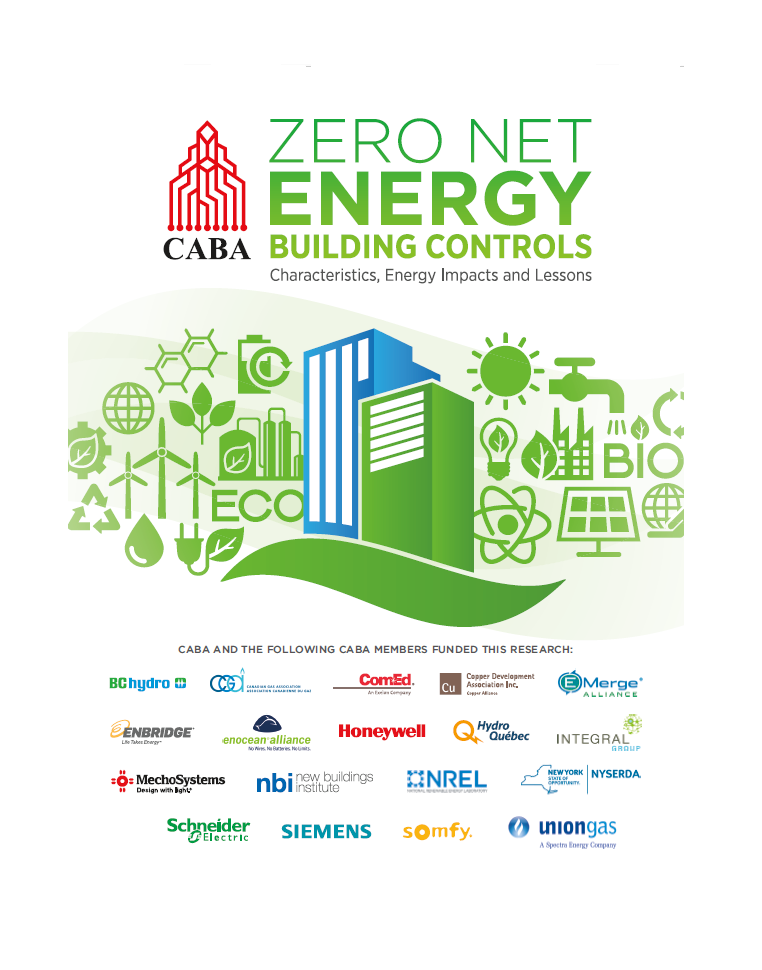
Zero Net Energy Building Controls: Characteristics, Energy Impacts and Lessons Learned Research Report
Report / December 19, 2015 / Controls
This commercial building research project was conducted by New Buildings Institute and led by the Continental Automated of Buildings Association (CABA). The objective was to characterize monitoring and control systems in Zero Net Energy (ZNE) buildings focused on three key…
Getting to Zero Energy Outcomes
Webinar / November 4, 2015
Getting to Zero relies more and more on what happens after design with as much as 50% of actual energy use influenced by the occupants and operators. This session brings together best practices, data on occupant driven energy, and new…
Teaming with Technology: A Manufacturer’s Panel
Webinar / October 21, 2015
Leading manufacturers will share their approaches to meet technical and market needs for low and zero energy buildings. The showcased technologies and manufacturer approaches highlight the energy and non-energy benefits of supporting the move to net zero.
Proposed Multifamily Building Section for the 2018 IECC
Document / October 16, 2015
NBI presented the first public “straw-man” of a proposed section for multifamily buildings in the 2018 International Energy Conservation Code (IECC) to the Department of Energy's Denver Energy Codes Stakeholder Meeting on October 13, 2015.
Why Net Zero Means Business for Owners
Webinar / September 16, 2015
Any building owner or real estate investor looking at a ZNE new construction or deep energy retrofit project is going to ask, "What value can I derive from the asset and operational changes in a ZNE building?" This session will…
Washington State Energy Code Roadmap
Report / September 11, 2015
The purpose of this roadmap is to provide context for the policy and code performance goals for new buildings in Washington law and identify the mechanisms and cycles by which code provisions can evolve to meet these goals. These code…
Progress Report 2013-2014
Report / August 13, 2015
This Progress Report begins with a message from our CEO and Board President and contains key highlights from our programs, reports and news.
Getting to Outcome-Based Building Performance Event Report
Report / May 6, 2015
This report summarizes the work undertaken by a group of building industry thought leaders who gathered for a Performance Outcome Summit in August 2014 in Seattle, Washington. During a day and a half workshop, the group examined the opportunities, barriers…
ZNE in California: Lessons Learned, Tools, Trends & New Technology Guides
Webinar / January 20, 2015
California is leading the nation in zero energy buildings and policy thanks to the great leadership and commitment of building innovators and early-adopter owners. Part one provides a 30-minute overview of emerging trends, lessons learned from the first group of…
Staying ahead of advancing energy codes with the New Construction
Webinar / December 16, 2014
With significant increases in stringency in the 2010 edition of ASHRAE’s Standard 90.1 and the 2012 edition of the International Energy Conservation Code, what was once high performance design is becoming minimum code. With the release of the New Construction…
Outcome-Based Performance Summit Summary
Report / September 12, 2014
Attention to achieving desired performance goals, particularly for energy use, through outcome-based requirements is growing. Given the numerous factors that influence actual performance (design, operations, climate, occupancy, etc.) and the traditional delivery pathways, important questions have been raised about how…
Implementing Building Performance Outcome Requirements
Webinar / July 30, 2014
This webinar focuses on projects that have successfully implemented outcome-based requirements. While the design of these projects is important, these case studies highlight issues related to contracts, teams and processes that drove the ultimate achievement of the desired outcomes.
Occupants, Plug Loads & Controls: What Happens After The Design Plug Load Best Practices GuideTeam Goes Home?
Webinar / June 18, 2014
Achieving zero net energy is not a point in time indicated by a plaque on the wall. It is a continual and ongoing process that requires the engagement of facility managers and occupants.
New Challenges in Net Zero Design
Webinar / June 16, 2014
Designing and delivering zero net energy projects brings a new set of challenges to designers: new building elements and technologies, new tools, and issues that in the past have been outside the scope of design efforts. Successful teams have found…
Transition to Net Zero: Design Paradigms for Creating Ultra-Efficient Buildings
Webinar / April 28, 2014
Architects, engineers, owners, operators and utilities come together during this session to understand the business motivations of pursing zero net energy projects, potential for this advanced design practice to become more widespread, and the technical and design challenges that need…
Incremental Costs of Zero Net Energy Buildings
Webinar / April 16, 2014
One of the most common barriers to zero net energy projects is the concern over incremental ZNE mapcosts compared to typical building practices. This session highlights the results of recent studies by states and organizations that explore the opportunities to…
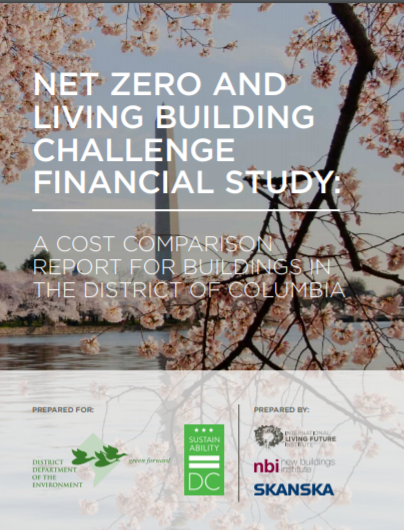
Net Zero and Living Building Challenge Financial Study: A Cost Comparison Report for Buildings
Report / April 16, 2014
The Net Zero and Living Building Challenge Financial Study investigates the anticipated cost differential between a set of three reference buildings designed to the LEED Platinum standard and those same three buildings conceptually designed for deep energy efficiency, net zero…
Making the Business Case for Zero Net Energy Buildings
Webinar / March 19, 2014
Zero net energy buildings are gaining market and media attention as the leading edge of design and business strategy for the built environment. A growing number of America’s leading companies such as Walgreens, TD Bank and PNC Bank are building…
State and Local Policies and Programs to Promote Zero Net Energy Buildings
Webinar / February 26, 2014
Several states and federal agencies have integrated a zero net energy goal into their long-term energy policy and program strategies.
2014 Getting to Zero Status Update Webinar
Webinar / January 16, 2014
Zero net energy projects, policies and programs are emerging across North America.
2014 Getting to Zero Status Update
Report / January 14, 2014
The 2014 Getting to Zero Status Update: A look at the projects, policies and programs driving zero net energy performance in commercial buildings, examines the numbers, locations, types, ownership as well as policy and program drivers for zero net energy…
Essential 7: Commercial Energy Code Voting Guidance for the 2015 IECC-Comm
Document / October 1, 2013
New Buildings Institute, Northwest Energy Codes Group, Institute for Market Transformation and Southwest Energy Efficiency Project identified seven key issues to ensure that the 2015 IECC improves energy efficiency, is easier to apply, and makes compliance and enforcement more straightforward.…
Title 24 Final FDD Language and Explanation
Document / April 24, 2013
The language included in the California Title 24-2013 Energy Standards for Non-Residential Buildings requiring certain FDD features in all new rooftop unit heating and cooling equipment of 5-ton capacity or greater starting in 2014.
High Performance Buildings Measured Performance and Key Performance Indicators
Report / April 24, 2013
This Final Research Summary Report summarizes the findings for the High Performance Buildings Measured Performance and Key Performance Indicators project within the Evidence-based Design and Operation research program.
Evidence-Based Design and Operations PIER Program: Improving the Real World Performance of Commercial Buildings
Report / April 23, 2013
This Final Project Report presents the results of the Evidence-based Design and Operations Research Program led by New Buildings Institute from 2008-2013. The program included four technical projects for commercial buildings. This work included the development of feedback tools for…
Enhanced Skylight Modeling and Validation
Report / April 23, 2013
This report details tasks, findings, and recommendations undertaken for the Enhanced Skylight Modeling and Validation project. The scope involved developing and validating computer simulation alternatives to physical measurements for producing optical daylighting system photometry.
Plug Loads
Report / March 24, 2013
Plug loads are among the biggest energy end uses in commercial office buildings. This is in part because plug loads are growing with greater information technology power demand and also because design approaches, codes and efficiency programs typically address other…
PIER Research Results
Report / March 19, 2013
Since 2000 NBI has been a part of major energy efficiency research on behalf of the California Energy Commission through the Public Interest Energy Research (PIER) endeavor. NBI’s latest PIER research program, Evidence-based Design and Operations, began in 2008 and…
Utility Programs in a World of Rapid, Code-Induced Advancements in Energy Baselines
Paper / September 7, 2012
In recent years, model energy codes – which traditionally require the implementation of specific measures and strategies at the time of new commercial and residential construction – have set the stage for large increases in energy savings as states and…
Key Performance Indicators – Field Metering Study and Energy Performance Feedback
Report / July 23, 2012
This report describes an investigation by NBI of metered key performance indicators (KPI) for commercial building energy use.
White Paper on Establishing a Pathway to Outcome-Based Code Policy
Paper / May 16, 2012
For several years, NBI has been engaged in wide‐ranging conversations about code stringency increases and the degree to which current code strategies can continue to achieve aggressive efficiency goals that have been targeted. We have come to recognize that current…
A Search for Deep Energy Savings
Report / August 23, 2011
A report from NEEA's BetterBricks program and New Buildings Institute investigates* 11 energy retrofits in existing commercial buildings that, on average, resulted in energy use 50% less than the national average – many with an energy use intensity (EUI) below…
Sensitivity Analysis: Comparing the Impact of Design, Operation, and Tenant Behavior on Building Energy Performance
Report / July 27, 2011
This study compares the magnitude of energy impact that various design features, operations and tenant behaviors have on total building energy use. The findings of this study can help the building community begin to align their priorities with those building…
Green Building Performance Evaluation: Measured Results from LEED-New Construction Buildings
Report / July 7, 2011
Is LEED delivering actual energy savings? This study addresses that question with a post-occupancy assessment of 121 LEED buildings across the country. Input to the study consisted of energy bills and brief descriptions of actual building use from owners, plus…
How Accurate is Energy Modeling in the Market?
Paper / June 21, 2011
This paper presents a study of whole building energy use of various completed LEED buildings throughout the nation. The paper focuses on the relationships between predicted and actual energy performance of 90 completed LEED certified buildings. The results of the…
Outcome-Based Energy Codes for Existing Buildings, Seattle Model Energy Code Project
Report / May 16, 2011
The Preservation Green Lab (PGL), the City of Seattle, and New Buildings Institute (NBI) are collaborating on a new energy code framework for existing and historic buildings that will pair accountability for actual performance outcomes with flexibility in how building…
Using Measured Whole-Building Performance for Green Building Program Evaluation
Paper / December 28, 2010
Green building program energy efficiency strategies often use integrated design, precluding the measurement of results simply from deemed savings of specific measures. This paper describes the use of whole-building measured energy use, by month and fuel, to evaluate the achievements…
A Tool for Efficient First-Views of Commercial Building Performance Results
Paper / August 19, 2010
This paper describes a new method of benchmarking monthly whole building energy. The resulting “first view” can identify the general nature of major building inefficiencies, thus directing further investigation of specific problems. The research, funded by a grant from EPA,…
Code Calibration: Understanding What Energy Codes Can Really Achieve
Paper / July 28, 2010
This paper observes that a key problem with current energy code practice is the difficulty in determining what level of performance the codes are delivering. Current energy code practice is based on estimated energy use of a theoretical sample of…
Energy Performance of LEED for New Construction Buildings
Report / February 17, 2010
NBI has completed the broadest study to-date of measured energy performance of LEED buildings called “Energy Performance of LEED for New Construction Buildings.” Aimed at better quantifying the actual energy performance levels of green building, the study gathered whole building…
Assessment of Market-Ready Evaporative Technologies for HVAC Applications
Report / January 28, 2010
NBI completed a report on the range of evaporative, evaporative hybrid and evaporative condensing technologies for HVAC applications on behalf of Southern California Edison including: technologies, manufacturers, market applications and adoption factors surrounding evaporative approaches to cooling.
Summary and Recommendations of the Getting to 50 Summit
Report / January 21, 2010
In March 2007, New Buildings Institute (NBI) hosted and facilitated the Getting to 50 Summit. This meeting of 60 experts was initiated to develop relationships and strategies which will significantly and rapidly reduce energy use in new and renovated commercial…
California Outdoor Lighting Baseline Assessment
Report / January 21, 2010
This is the first major study to provide real data about commercial building outdoor lighting in the State of California. The report identifies statewide outdoor lighting design practices; estimates energy demand and consumption; and provides a framework for outdoor lighting…
Daylight and Retail Sales
Report / October 21, 2003
This study presents evidence that a chain retailer is experiencing higher sales in daylit stores than in similar non-daylit stores.
Windows and Offices: A Study of Office Worker Performance and the Indoor Environment
Report / October 21, 2003
This study reports on a statistical investigation into the influences indoor physical environment has on office worker performance, especially daylight and view, and secondarily ventilation and thermal comfort.
Windows and Classrooms: A Study of Student Performance and the Indoor Environment
Report / October 21, 2003
This study investigates whether daylight and other aspects of the indoor environment in elementary school student classrooms have an effect on student learning, as measured by their improvement on standardized math and reading tests over an academic year.
